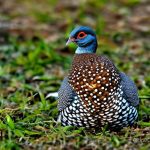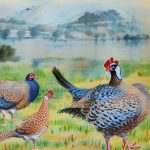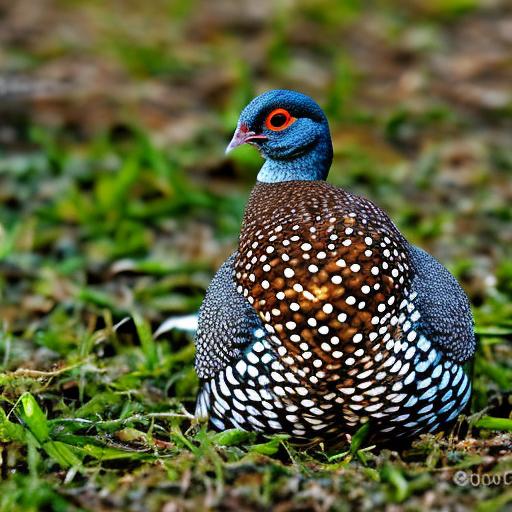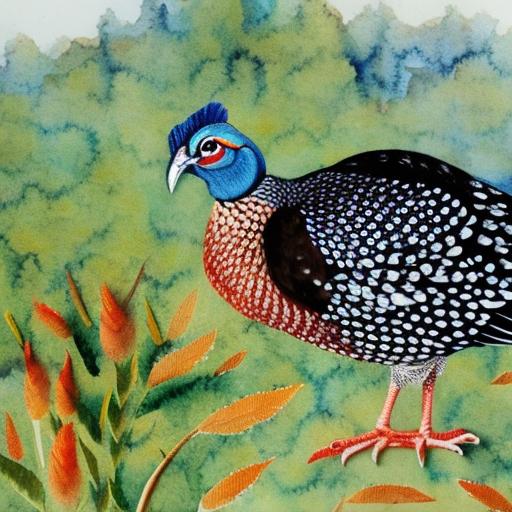Guinea fowl, also known as pintades, have a long history in South Africa. These birds are native to the African continent and have been domesticated for centuries. They were originally brought to South Africa by European settlers and have since become a popular choice for farmers and breeders. Guinea fowl are known for their hardiness and adaptability, making them well-suited to the South African climate and landscape.
In South Africa, guinea fowl are not only raised for their meat, but also for their eggs, which are considered a delicacy. The birds are also valued for their ability to control pests such as ticks, flies, and other insects, making them a valuable asset to farmers. Over the years, guinea fowl have become an integral part of South Africa’s agricultural landscape, with many farmers relying on them for pest control and sustainable meat and egg production.
Key Takeaways
- Guinea fowl were introduced to South Africa in the 17th century by European settlers and have since become popular for their meat and pest control abilities.
- Breeding guinea fowl in South Africa can provide a sustainable source of protein, pest control, and income for farmers.
- When choosing breeding stock, look for healthy, active birds with good body conformation and strong genetics to ensure successful breeding.
- Proper housing and care for breeding guinea fowl includes providing adequate space, protection from predators, and a balanced diet.
- Breeding and incubating guinea fowl eggs requires a dedicated incubator, proper temperature and humidity control, and regular monitoring of the hatching process.
- Health and disease management in breeding guinea fowl involves regular vaccinations, parasite control, and prompt treatment of any illnesses.
- Marketing and selling guinea fowl in South Africa can be done through local markets, restaurants, and online platforms, with a focus on the unique flavor and nutritional benefits of guinea fowl meat.
The Benefits of Breeding Guinea Fowl in South Africa
Breeding guinea fowl in South Africa offers a range of benefits for farmers and breeders. These birds are known for their low maintenance requirements, making them a cost-effective option for those looking to diversify their livestock. Guinea fowl are also excellent foragers, meaning they can help control pests and reduce the need for chemical pesticides on farms. This makes them an environmentally friendly choice for sustainable agriculture.
In addition to their pest control abilities, guinea fowl are also valued for their meat and eggs. The meat of guinea fowl is lean and flavorful, making it a popular choice for consumers looking for a healthy and sustainable protein source. Their eggs are also highly prized for their rich flavor and nutritional value. By breeding guinea fowl, farmers in South Africa can tap into the growing demand for organic and free-range poultry products, offering them a lucrative market opportunity.
Choosing the Right Breeding Stock for Guinea Fowl
When it comes to breeding guinea fowl in South Africa, choosing the right breeding stock is crucial for success. It’s important to select birds that are healthy, well-adapted to the local climate, and have desirable traits such as good egg production or meat quality. When choosing breeding stock, it’s also important to consider genetic diversity to avoid inbreeding and maintain the overall health and vigor of the flock.
It’s recommended to source breeding stock from reputable breeders or hatcheries that prioritize the health and welfare of their birds. Look for birds that are active, alert, and free from any signs of disease or deformities. It’s also important to consider the age of the breeding stock, as younger birds are generally more fertile and have a longer reproductive lifespan. By carefully selecting the right breeding stock, farmers and breeders can ensure the success of their guinea fowl breeding program and maintain the overall quality of their flock.
Housing and Care for Breeding Guinea Fowl
Proper housing and care are essential for the health and well-being of breeding guinea fowl in South Africa. When it comes to housing, guinea fowl require a secure and predator-proof coop or aviary to protect them from predators such as foxes, snakes, and birds of prey. The coop should also provide adequate ventilation and protection from the elements, as well as nesting boxes for egg-laying hens.
Guinea fowl are social birds and should be kept in groups to prevent stress and aggression. It’s important to provide ample space for the birds to roam and forage, as they are highly active and enjoy exploring their surroundings. Additionally, providing a balanced diet that includes a mix of commercial poultry feed, grains, greens, and insects is essential for the health and productivity of breeding guinea fowl. By providing proper housing and care, farmers and breeders can ensure the well-being of their guinea fowl flock and maximize their breeding potential.
Breeding and Incubating Guinea Fowl Eggs
Breeding guinea fowl in South Africa involves careful management of egg production and incubation. Guinea fowl are seasonal layers, with peak egg production occurring in the spring and summer months. It’s important to collect eggs regularly to prevent them from being damaged or eaten by other birds. Once collected, the eggs should be stored in a cool, dry place with a consistent temperature until they are ready for incubation.
When it comes to incubating guinea fowl eggs, it’s important to use a reliable incubator that maintains a consistent temperature and humidity level. Guinea fowl eggs typically require 26-28 days of incubation before hatching. During this time, it’s important to regularly monitor the temperature and humidity levels to ensure optimal conditions for embryo development. Once hatched, the chicks should be provided with a warm brooder area and a balanced diet to support their growth and development.
Health and Disease Management in Breeding Guinea Fowl

Maintaining the health of breeding guinea fowl is essential for the success of any breeding program in South Africa. It’s important to implement a proactive health management plan that includes regular health checks, vaccinations, and parasite control. Monitoring the flock for any signs of illness or disease is crucial for early intervention and preventing the spread of infections.
Common health issues in guinea fowl include respiratory infections, parasites, and nutritional deficiencies. It’s important to work with a veterinarian who has experience with poultry to develop a comprehensive health management plan tailored to the specific needs of guinea fowl. Additionally, providing a clean and sanitary living environment, along with a balanced diet, can help prevent many common health problems in breeding guinea fowl.
Marketing and Selling Guinea Fowl in South Africa
Once breeding guinea fowl in South Africa has been successful, farmers and breeders can explore various marketing and selling opportunities for their products. There is a growing demand for organic and free-range poultry products in South Africa, making guinea fowl meat and eggs an attractive option for consumers looking for high-quality, sustainable protein sources. Farmers can sell their products directly to consumers through farmers’ markets, online platforms, or on-farm sales.
In addition to direct sales, farmers can also explore partnerships with local restaurants, specialty food stores, or butchers to supply guinea fowl products. Building relationships with potential buyers and promoting the unique qualities of guinea fowl meat and eggs can help create a niche market for these products. By effectively marketing and selling guinea fowl products, farmers can capitalize on the growing demand for sustainable and ethically produced poultry in South Africa.
If you’re interested in breeding guinea fowl in South Africa, you may also want to check out this informative article on creating the perfect chicken coop for your poultry. The article provides valuable insights into designing a functional and comfortable coop for your chickens, ensuring their well-being and productivity. You can read more about it here.
FAQs
What is the breeding season for guinea fowl in South Africa?
The breeding season for guinea fowl in South Africa typically occurs during the spring and summer months, from September to February.
How do guinea fowl breed in South Africa?
Guinea fowl in South Africa typically breed through natural mating. The male guinea fowl will display courtship behavior to attract a female, and then mating occurs.
What is the incubation period for guinea fowl eggs in South Africa?
The incubation period for guinea fowl eggs in South Africa is approximately 26 to 28 days.
What are the ideal conditions for breeding guinea fowl in South Africa?
Ideal breeding conditions for guinea fowl in South Africa include providing a secure and spacious environment, access to a variety of foods, and protection from predators.
How many eggs do guinea fowl typically lay during the breeding season in South Africa?
Guinea fowl in South Africa typically lay between 20 to 30 eggs during the breeding season, with the female guinea fowl often laying one egg per day.
Meet Walter, the feathered-friend fanatic of Florida! Nestled in the sunshine state, Walter struts through life with his feathered companions, clucking his way to happiness. With a coop that’s fancier than a five-star hotel, he’s the Don Juan of the chicken world. When he’s not teaching his hens to do the cha-cha, you’ll find him in a heated debate with his prized rooster, Sir Clucks-a-Lot. Walter’s poultry passion is no yolk; he’s the sunny-side-up guy you never knew you needed in your flock of friends!







